Introduction

Truffle oil has become a beloved and sought-after ingredient in the culinary world, adding a touch of luxury and sophistication to dishes. Whether it’s the subtle nuances of white truffle oil or the robust earthiness of black truffle oil, these exquisite essences have the power to transform ordinary meals into extraordinary culinary creations. In this blog, we will delve into the differences between black truffle oil and white truffle oil, exploring their characteristics, flavor profiles, culinary uses, and how to identify authentic oils. Get ready to elevate your dishes with the unmistakable essence of truffles.
Background And History Of Truffle Oil
The use of truffle oil can be traced back to ancient times when truffles were highly prized and considered a delicacy in Mediterranean cuisine. Traditionally, truffles were used fresh, but as their popularity grew, the demand led to the creation of truffle-infused oils. Truffle oil was initially made by steeping truffle shavings in a neutral oil, allowing the oil to absorb the truffle’s distinct aroma and flavor. Today, truffle oil is widely available and has become a beloved ingredient in gourmet cooking, adding a touch of luxury and sophistication to various dishes.
Understanding The Difference Between Black Truffle Oil And White Truffle Oil
Black truffle oil and white truffle oil differ in their fragrance and flavor profiles. Black truffle oil exhibits a strong and earthy aroma, adding depth and intensity to dishes. Its flavor is characteristic of rich umami notes with a hint of mushroom. In contrast, white truffle oil has a more delicate fragrance, reminiscent of onion and garlic. It imparts a subtle yet distinct flavor, enhancing the natural flavors of ingredients without overpowering them. Understanding these differences allows chefs and home cooks to choose the appropriate truffle oil for their recipes and create culinary masterpieces.
Characteristics And Flavor Profile
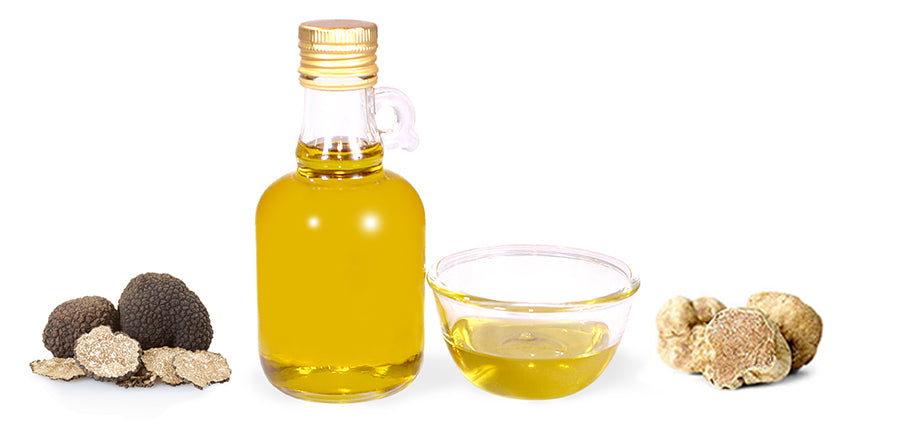
Black truffle oil is known for its robust and intense characteristics. It has a strong, earthy aroma that adds depth and richness to dishes. The flavor profile of black truffle oil is characterized by rich umami notes, with hints of musk chocolate and an essence reminiscent of the forest floor. On the other hand, white truffle oil offers a more delicate and refined scent, with subtle notes of damp earth and a touch of garlic. Its flavor profile is subtle yet distinct, enhancing the natural flavors of ingredients without overpowering them.
Characteristics And Aroma Of Black Truffle Oil
Black truffle oil is known for its robust and intense characteristics. It has a strong, earthy aroma that adds depth and richness to dishes. The flavor profile of black truffle oil is characterized by rich umami notes, with hints of musk chocolate and an essence reminiscent of the forest floor. Its bold aroma can instantly transform any dish, from pasta and risotto to grilled meats and roasted vegetables. The potent fragrance of black truffle oil is a testament to its superior quality and ability to enhance the flavors of a wide range of culinary creations.
Distinctive Qualities And Flavor Profile Of White Truffle Oil
White truffle oil is renowned for its distinctive and refined qualities. It offers a delicate and earthy scent, with subtle notes of damp earth and a hint of garlic. The flavor profile of white truffle oil is characterized by its subtlety and finesse, making it an excellent choice for dishes that require a lighter touch. Its nuanced flavors enhance delicate ingredients like seafood, eggs, and mild cheeses, allowing their natural flavors to shine. The subtle yet sophisticated essence of white truffle oil adds a touch of elegance and refinement to any culinary creation.
Culinary Uses
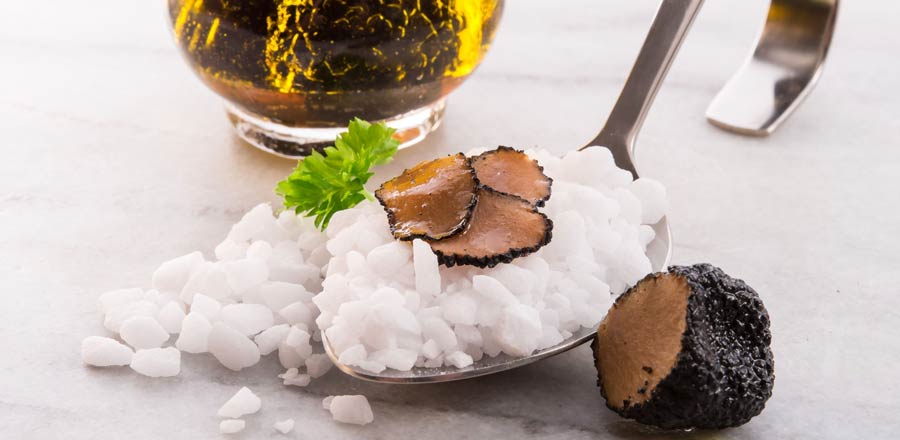
Truffle oil, whether black or white, offers a wide range of culinary uses that elevate dishes to new levels of luxury and flavor. Black truffle oil is commonly used in savory dishes to enhance the earthy and robust flavors of meats, roasted vegetables, and grilled seafood. Its intense and pungent aroma adds depth and complexity to sauces, soups, and dressings. On the other hand, white truffle oil is perfect for enhancing delicate flavors. Its subtle and refined essence pairs beautifully with seafood, eggs, and mild cheeses, allowing their natural flavors to shine. Whether drizzled over pasta, risotto, or salads, both black and white truffle oil infuse dishes with an unparalleled indulgence.
Black Truffle Oil: Enhancing Savory Dishes
Black truffle oil is widely used to enhance the flavors of savory dishes, adding an earthy and robust undertone. Its intense aroma and distinctive flavor profile make it the perfect addition to meats, roasted vegetables, and grilled seafood. The oil can be drizzled over pasta, risotto, or salads, infusing them with a luxurious and indulgent essence. Additionally, it can be incorporated into sauces, soups, and dressings, providing depth and complexity. Black truffle oil effortlessly elevates savory dishes, making them more sophisticated and gourmet.
White Truffle Oil: Elevating Delicate Flavors
White truffle oil, with its delicate and refined aroma, is perfect for enhancing delicate flavors in dishes. Its subtle notes of damp earth and hint of garlic add a touch of elegance to any recipe. White truffle oil pairs exceptionally well with light and creamy dishes such as pasta, risotto, or scrambled eggs. Its gentle essence helps to enhance the flavors of ingredients without overpowering them. Drizzle white truffle oil over salads, soups, or roasted vegetables to elevate their taste and create a gourmet experience. Its delicate flavors make it a versatile ingredient that adds a touch of sophistication to any dish.
Selection And Quality
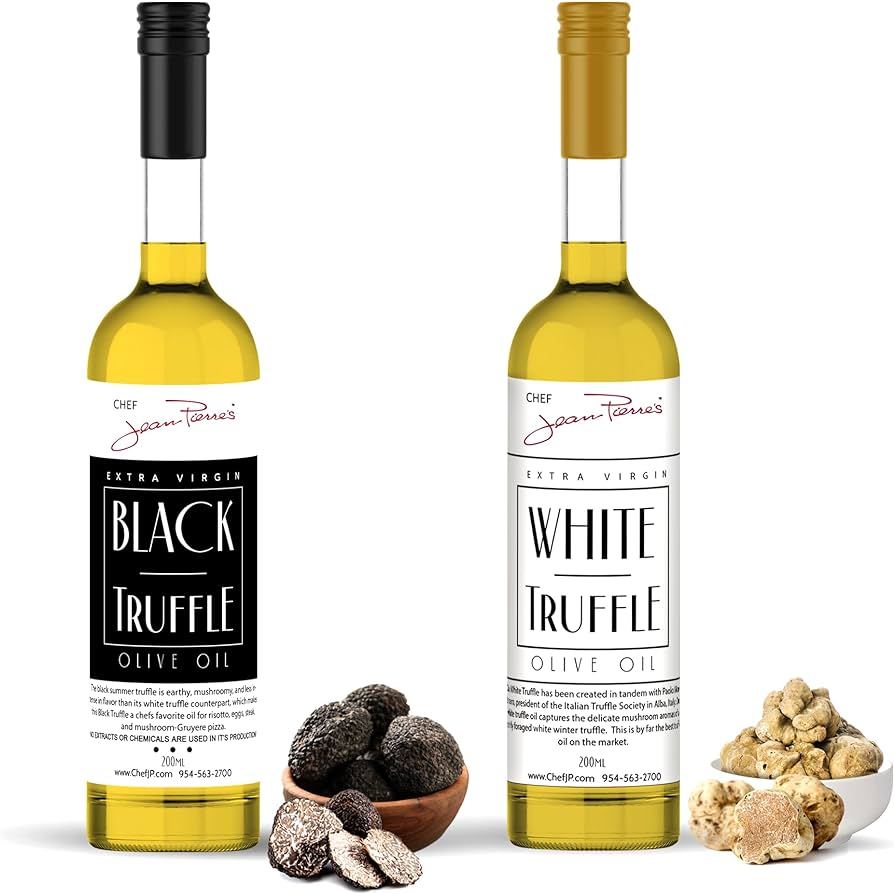
When selecting truffle oil, it is important to consider the quality of the product. For black truffle oil, look for oils that are made with real black truffle extract or essence. The quality of the truffle used will greatly impact the flavor of the oil. Opt for oils that have a strong and authentic truffle aroma. When it comes to white truffle oil, choose oils that are made with real white truffle extract. Look for oils that have a delicate and refined aroma, as this indicates a higher quality product. Remember to always read the labels and choose oils that are made with real truffle ingredients for the best quality and flavor.
Factors To Consider When Choosing Black Truffle Oil
When selecting black truffle oil, there are a few factors to consider to ensure you choose a high-quality product. Here are some important factors to keep in mind:
- Real truffle extract: Look for oils that are made with real black truffle extract or essence. This will ensure an authentic and robust truffle flavor.
- Aroma: Opt for oils that have a strong and authentic truffle aroma. The aroma should be earthy, musky, and reminiscent of fresh truffles.
- Quality of truffle: The quality of the truffle used will greatly impact the flavor of the oil. Choose oils made with premium black truffles for a more intense and luxurious taste.
- Ingredients: Read the labels and choose oils that contain real truffle ingredients. Avoid oils that use synthetic or artificial flavors.
By considering these factors, you can select a high-quality black truffle oil that will enhance your dishes with its rich and decadent flavor.
Assessing The Quality Of White Truffle Oil
Assessing the quality of white truffle oil is essential to ensure an authentic and flavorful experience. When evaluating the quality, consider the following factors:
- Source of truffles: Opt for oils made from real white truffle extract. Look for products that specify the origin of the truffles, as certain regions are known for producing high-quality truffles.
- Aroma: A premium white truffle oil will have a distinct, earthy aroma reminiscent of fresh truffles. Avoid oils with a weak or artificial scent.
- Flavor intensity: The flavor of white truffle oil should be robust and intense. It should impart a rich, garlicky, and musky taste to your dishes.
- Ingredients: Read the labels to ensure that the oil contains real white truffle ingredients. Avoid options with artificial or synthetic flavors.
By considering these factors, you can select a high-quality white truffle oil that will enhance your dishes with its delicate and luxurious flavor.
Misconceptions And Authenticity
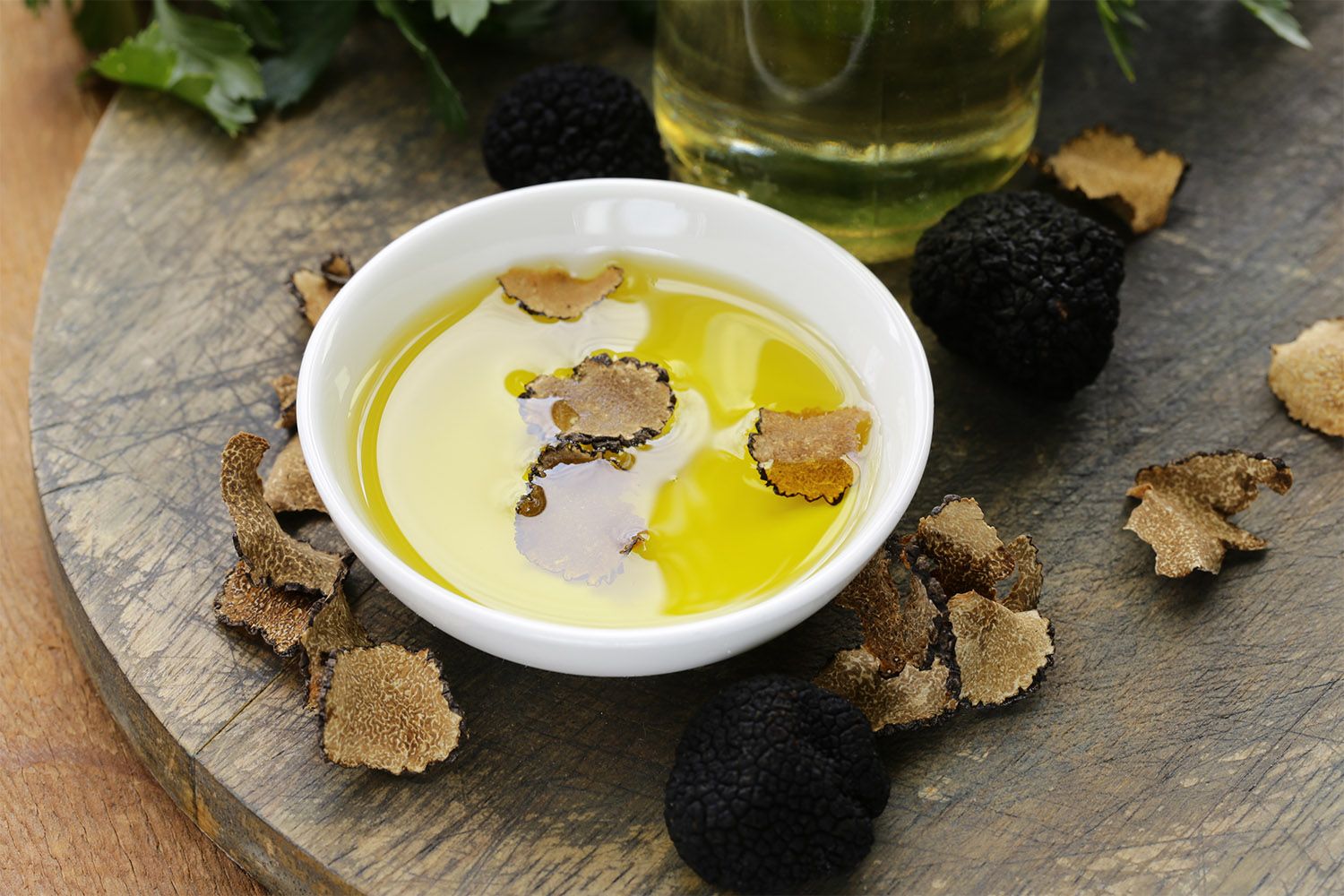
There are some misconceptions surrounding truffle oil that need to be addressed. One common misconception is that all truffle oils are made with real truffles. However, many truffle oils on the market are actually made with artificial or synthetic flavors, lacking the authentic truffle essence. This is why it is crucial to read the labels and look for oils that contain real truffle ingredients.
To ensure the authenticity of truffle oil, it is recommended to purchase from reputable sources and brands that are transparent about their sourcing and production process. By doing so, you can enjoy the true flavors and aromas of truffle oil and enhance your dishes with its luxurious essence.
Dispelling Misconceptions About Truffle Oil
There are some misconceptions surrounding truffle oil that need to be addressed. One common misconception is that all truffle oils are made with real truffles. However, many truffle oils on the market are actually made with artificial or synthetic flavors, lacking the authentic truffle essence. This is why it is crucial to read the labels and look for oils that contain real truffle ingredients. To ensure the authenticity of truffle oil, it is recommended to purchase from reputable sources and brands that are transparent about their sourcing and production process. By doing so, you can enjoy the true flavors and aromas of truffle oil and enhance your dishes with its luxurious essence.
Ensuring Authenticity And Avoiding Synthetic Oils
To ensure the authenticity of truffle oil and avoid synthetic versions, it is essential to read the labels and look for oils that contain real truffle ingredients. Consumers should purchase from reputable sources and brands that are transparent about their sourcing and production processes. Additionally, it is important to be cautious of truffle oils that are labeled as “truffle aroma” or “truffle-flavored,” as these are often indications of synthetic oils. By taking these precautions, individuals can enjoy the true flavors and aromas of truffle oil and enhance their dishes with the luxurious essence of real truffles.
Conclusion
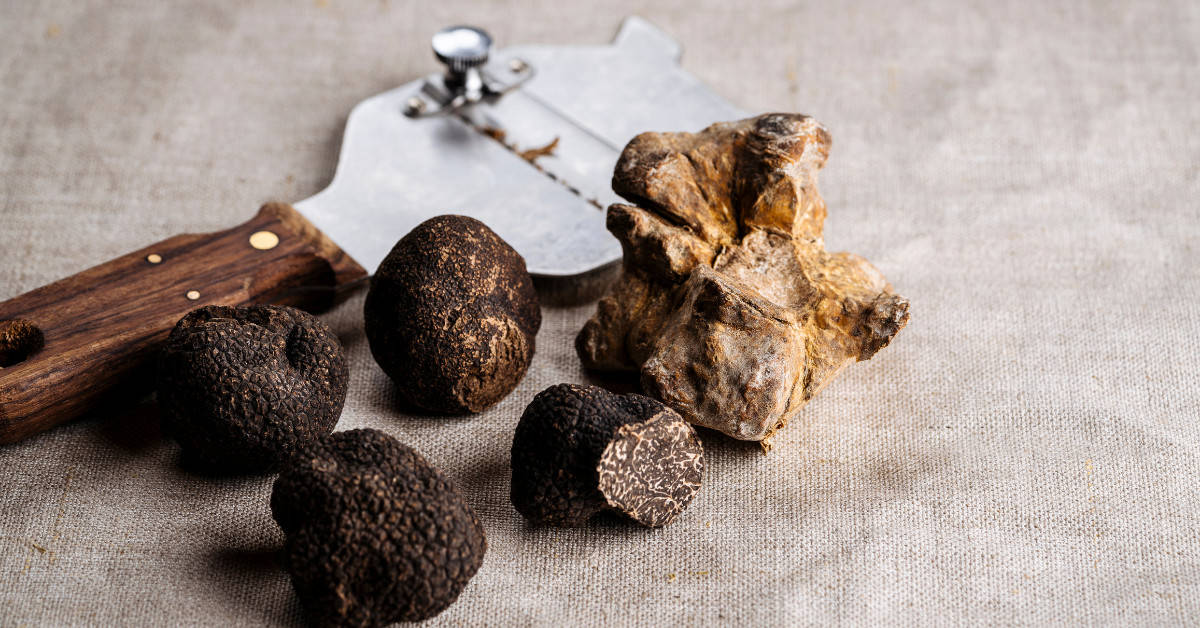
In conclusion, the comparison between black truffle oil and white truffle oil reveals their distinct characteristics and flavors. Black truffle oil enhances savory dishes with its bold taste and rich aroma, while white truffle oil elevates delicate flavors with its subtle earthiness. When selecting truffle oil, it’s important to consider factors like sourcing and quality. To ensure authenticity, consumers should read labels carefully and avoid synthetic oils. By incorporating truffle oil into their culinary creations, chefs and food enthusiasts can add a touch of decadence and elevate their dishes with the luxurious essence of truffles.
Using Truffle Oil As A Gourmet Ingredient
Truffle oil is highly prized in the culinary world for its ability to elevate dishes to gourmet status. Its intense aroma and distinct flavor make it a versatile ingredient that can enhance a wide range of dishes. Chefs and food enthusiasts often use truffle oil as a finishing touch, drizzling it over pasta, risottos, and roasted vegetables to add depth and complexity. It can also be used as a flavoring agent in sauces, dressings, and marinades. The luxurious essence of truffle oil adds a touch of extravagance to any dish, making it a must-have in the gourmet kitchen.
Experimenting And Enhancing Dishes With Black And White Truffle Essence
Food enthusiasts and chefs alike can get creative in the kitchen by experimenting with black and white truffle essence. The intense aroma and distinctive flavor of truffle oil can elevate a variety of dishes to new heights of gourmet excellence. Try drizzling black truffle oil over grilled steaks, risottos, or roasted mushrooms for a rich and earthy flavor. White truffle oil, on the other hand, can be used to enhance delicate flavors, such as in creamy pasta sauces or drizzled over scrambled eggs. With these exquisite ingredients, culinary exploration knows no bounds. Let your imagination run wild and delight in the luxurious essence of truffle oil.
Frequently Asked Questions: Black Truffle Oil vs. White Truffle Oil
- What is the difference between black truffle oil and white truffle oil?
Black truffle oil is made using black truffles (Tuber melanosporum) while white truffle oil is made using white truffles (Tuber magnatum). - What do black and white truffles taste like?
Black truffles have a robust earthy flavor with hints of chocolate, while white truffles have a more delicate and garlicky taste with notes of honey. - What are the similarities in aroma between black and white truffle oil?
Both black and white truffle oils carry a distinctively pungent and aromatic fragrance. However, the intensity and specific notes may differ slightly. - Are black or white truffle oils more common?
Black truffle oil is more commonly found and used in cooking due to its availability and more affordable price. White truffle oil is rarer and therefore higher in price. - Which truffle oil is better for drizzling or finishing dishes?
The choice between black and white truffle oil for finishing dishes depends on personal preference. Black truffle oil’s bold flavor complements hearty dishes like pasta, risotto, or grilled meats. White truffle oil is often used to enhance simple dishes like pasta, eggs, or salads. - Can black truffle oil be substituted for white truffle oil in recipes?
While both oils can be used interchangeably in recipes, it’s important to remember that the flavor of black truffle oil is stronger. So, when substituting black truffle oil for white, use a smaller quantity to avoid overpowering the dish. - How should truffle oil be stored?
Truffle oil should be stored in a cool, dark place away from direct sunlight. Ensure that the bottle is tightly sealed to maintain its freshness. It is also recommended to use truffle oil within a few months of opening to preserve its aroma and flavor. - Do black and white truffle oils contain real truffles?
Authentic truffle oil is made by infusing high-quality olive oil with real truffles; however, some lower-quality truffle oils may use artificial flavorings. So, always check the ingredient label to ensure you are purchasing a genuine product.
In summary, while black truffle oil has a stronger flavor and is more commonly used, white truffle oil offers a more delicate taste. Both oils can add a touch of luxury to your dishes, so experiment with them based on your own palate preferences. Just remember to choose a high-quality truffle oil made with real truffles for the best flavor experience.

From At-Home Dinner Parties to Family Reunions to Office Parties, we can cater your next Event!